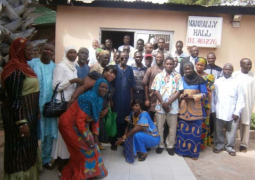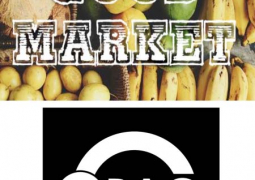UNHCR, responsible for refugees and asylum-seekers have gathered several refugees and many citizens on a three-day stigma and discrimination sensitisation. The body believes getting refugees and their host involved would encourage voluntary testing and decrease stigma and discrimination. It also believes in an unprecedented response from all and sundry. Stigma is believed to be the single most important barrier to public action, causing people to be afraid of seeing a doctor to determine whether they have the disease. The stride taken by UNHCR and their partners have been applauded by many and have demanded for more. Read on and see how the three-day sensitisation fared on and how refugees and their hosts gained from the event.
The three-day sensitisation started with a match pass starting from Shell at Churchill's Town with hundreds of refugees and hosts. The theme boldly written on their T-shirts and banners, "Stigma and Discrimination" - 'It has no place in our society." Participants walked amidst singing jubilantly to the Buffer Zone as the Police Band sang and played on where significant and touching messages were delivered by those concerned with HIV and AIDS and the president of those living with the HIV/AIDS.
Sekou Saho, Head of UNHCR Office in The Gambia in his opening speech said that by what he sees, it seems that the fight against stigma and discrimination for people living with HIV/AIDS was well on its way to success. "I am proud to be here with all stakeholders to collectively address stigma and discrimination, the theme that brought us together," he said.
He further said that UNHCR in its mandate is committed to combating stigma and discrimination of any nature against refugees, asylum-seekers and other persons of concern. He expressed his joy in seeing people from different backgrounds, ranging from different nationalities, refugees, Gambians, students, teachers, doctors to name but a few.
UNHCR has been involved in the protection of refugees in the country in a long time. The head of the institution therefore believes in working together to ensure that people, including refugees are not subjected to any discriminatory practices based on real or perceived HIV status and both refugees and host communities have access to qualify and confidential services in that regard.
Sehou Saho said it was equally important that they removed the stereotypical classification of refugees as being at risk group compared to the host communities. He was pleased to seeing refugees working hand in hand with host communities.
The photographs displayed are photos of people affected by HIV/AIDS from across the world. I hope the artwork and photos will further raise our awareness. HIV impacts the lives of people across the world. The photographs from all over the world will help us gain insight into the effects of HIV upon individuals, families and communities," Saho said.
Bai Cham, Deputy Director of NAS on behalf of the Director of NAS on the Positive Lives Exhibition at the same venue, said it was the beginning of the three-day activity to show case the consequences of stigma and discrimination of people living with HIV and households affected by HIV. "The aftermath of these events is expected to entice individuals, friends, communities and family members to be real supporters of those infected or affected by HIV," he said. Cham further said that it was taking place during the time when the sub-region was experiencing an accelerated increase in HIV/AIDS prevalence. And happening at a time when the government of The Gambia is vigorously advocating for a greater partnership across the entire social spectrum in the response towards HIV/AIDS and its related problems. He says, "You will agree with me that HIV/AIDS is the single biggest threat to our development and a big concern for our collective security. The global economic crisis, diseases, infections, disaster associated with the global warming and skyrocketing HIV prevalence characterise our world and the need for greater efforts required from governments, organisations, institutions, individuals and communities to create a unified response," he said.
"Stigma is as old as history dating back to ancient Greek times. Underlying that fear is often ignorance - such as ignorance of the way of life of stigmatised groups, ignorance of the realities of sexual behaviour or ignorance of the way in which diseases spread," he said.
Bai Cham said, stigma resorts to discrimination, which is being regarded as a real or perceived negative response to a person or persons by individuals, community or society; characterised by rejection, denial, and discrediting, disregarding, and underrating and social distance. Stigma and discrimination have long been associated with disease, particularly associated to disfigurement through their association with disfigurement and death. "In the past individuals suffering from TB, leprosy, cholera and polio they have all suffered stigma and the discrimination that ensues," he said.
He said people with HIV are often believed to have deserved what happened to them by doing what was wrong, which wrongdoings are often linked to sex or to illegal and socially-frowned-upon activities, such as injecting drug use. Men who are infected may be seen as homosexuals, bisexuals or viewed as having had sex with prostitutes and women with HIV/AIDS are viewed as having been 'promiscuous' or as having been sex workers. "HIV may inadvertently be spread by people who may not know that they are HIV positive. Some may not want to admit they might have the disease, thus the need to encouraging people to conduct VCT and to break the silence and bring down barriers to effective HIV prevention, education and treatment by supporting efforts to eliminate the stigma. We must continue to encourage positive behavioural change to reduce new infection of HIV, there is need for tolerance, compassion, care and support for people living with or affected by HIV/AIDS, he said.
Talking on HIV and AIDS related stigma and Discrimination in his introduction quoting Kofi Annan Nuha Ceesay UNAIDS Country Officer, said AIDS is an unprecedented global crisis requiring an unprecedented response from each an every one of us. Turning back the HIV epidemic is a task beyond individual efforts, no matter how outstanding or heroic. It requires communities, nations and regions to come together in co-ordinated, concerted action.
He quoted Ban Ki Moon saying, "Stigma remains the single most important barrier to public action. It is the main reason too many people are afraid to see a doctor to determine whether they have the disease or to seek treatment if so. It helps make AIDS the silent killer, because people fear the social disgrace of speaking about it, or taking easily available precautions. Stigma is a chief reason the AIDS epidemic continues to devastate societies around the world."
Nuha Ceesay said realisation of human rights and fundamental freedoms for all is essential to reduce vulnerability to HIV/AIDS. Respect for people living with AIDS drives an effective response. He suggested that the state should enact or strengthen anti-discrimination and other protective laws that protect vulnerable groups, people living with HIV/AIDS and people with disabilities from discrimination in both the public and private sectors, that will ensure privacy and confidentiality and ethics in research involving human subjects, emphasise education and conciliation, and provide for speedy and effective administrative and civil remedies. He further mentioned other guidelines including, national framework, supportive community partnership, public health legislation, criminal laws and correctional systems, anti-stigma and protection laws, universal access, legal support services, women children and other vulnerable groups, state monitoring and enforcement and international co-orperation.
Nuha Ceesay said stigma could be described as the quality that significantly discredits an individual in the eyes of others. It has consequences for the way in which individuals come to see themselves. He further named ignorance, prejudice, power and domination images of HIV/AIDS in the media, unfriendly terminalogies, xenophobia, culture and tradition, convenient to blame, fear and shame, sex and drugs as causes of stigma and discrimination.
Lamin Moko Ceesay, the president of the Santa Yalla Society, acknowledged that he got infected some ten years ago and was detected in
Ceesay further said that people should come out and demystify the ignorance and the fear in our communities by showing a human face of the virus that HIV is really existing and people living with it should be shown understanding. The young living with the virus should continue to learn about it.
There was exhibition at the Alliance Franco Gambienne including drawings and quiz competition between seven Lower Basic Schools in Region One. Poem presentation was done and impressive poems were read. Prizes were presented.
The 2nd day saw participants at the Joint Officers Mess and many dignitaries spoke on the topic in a symposium organised by UNHCR and partners.
The third day took participants and hundreds of well wishers to Brikama for the Candlelight match through the town. Two buses ferried participants from West Field. Many refugees and citizens were in the street as the Scout Band played on to the court for further presentations.



